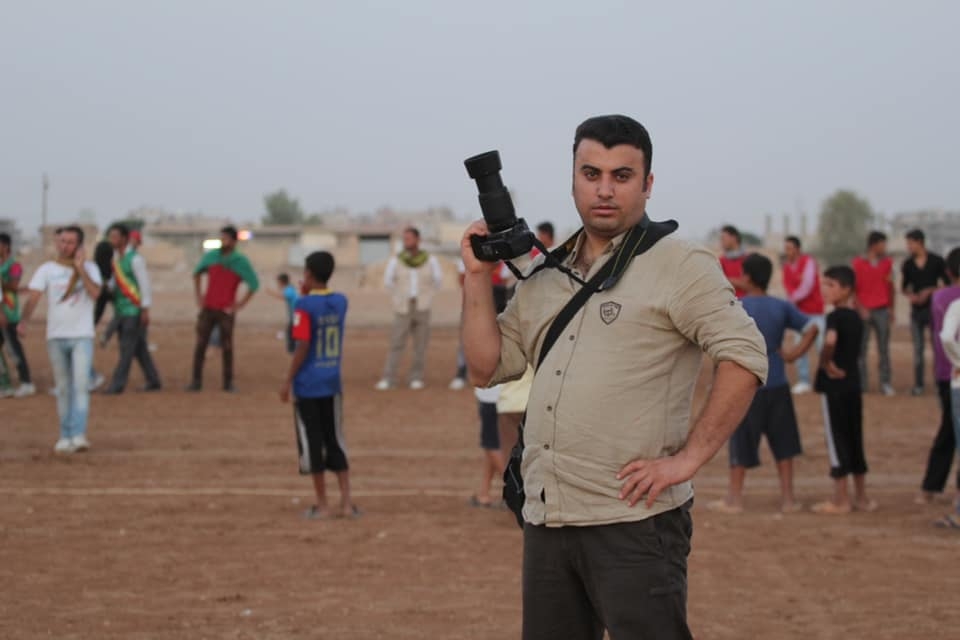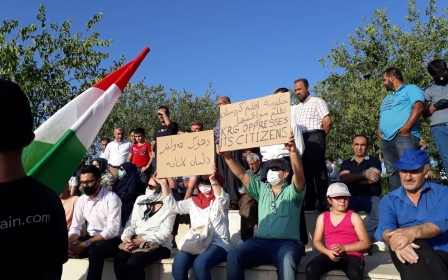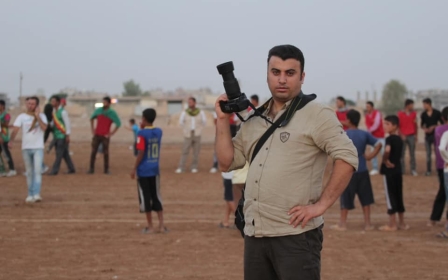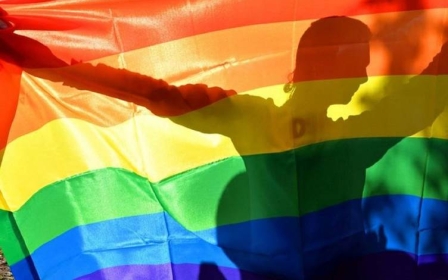Iraq: Kurdish authorities criticised for upholding sentences against journalists and activists

Rights groups have sounded the alarm after authorities in Kurdistan announced last week that they would uphold controversial sentences against five Kurdish journalists and activists.
Observers warn that press freedom in the region is on the decline, with the appeal court's decision now raising questions over the independence of the region’s judiciary. The decision came just a day after World Press Freedom Day.
In February, Kurdish journalists Sherwan Amin Sherwani, Guhdar Zebari, and activists Shivan Saeed, Ayas Karam, and Arewan Essa were found guilty of “endangering the national security of the Kurdistan region” by Erbil's Second Court of First Instance and were sentenced to six years in jail.
On 28 April, three out of the five judges on Erbil's Court of Cassation decided to uphold the six-year jail sentences against the five men, according to a copy of the court’s verdict obtained by MEE.
In an appeal court ruling last week the KRG ruled that the judiciary had acted independently of government.
New MEE newsletter: Jerusalem Dispatch
Sign up to get the latest insights and analysis on Israel-Palestine, alongside Turkey Unpacked and other MEE newsletters
But defence lawyers and human rights advocates have alleged to Middle East Eye (MEE) that the original trial was flawed and that the men were subjected to torture and forced into confessing by Kurdish security during interrogations, with threats made to rape Sherwani's wife.
“They had intended to target sensitive areas and establishments in the Kurdistan region… They had also contacted the American consulate and German consulate and took money from them. They also communicated with the Kurdistan Workers’ Party (PKK),” reads the appeal court’s ruling, which was made public on last week.
'Unfair political decision'
Mohammed Abdulla, a lawyer defending the five prisoners, called the decision by the Erbil's court an “unfair political decision”, as the five judges are affiliated to the two ruling Kurdish political parties, the Kurdistan Democratic Party (KDP) and its rival, the Patriotic Union of Kurdistan (PUK).
“Three judges from the KDP upheld the lower court’s decision, while the other two judges from the PUK rejected the verdict,” Abdulla told MEE.
A week prior to February’s ruling, the KDP-affiliated prime minister of the Iraqi Kurdistan Regional Government (KRG), Masrour Barzani, claimed in a press conference that the detainees were "neither activists nor journalists".
"Some of them were spies. They spied for other countries… Some were saboteurs," he said.
Abdulla said his clients would appeal the sentences, but added that he felt there was “little hope” that the general board of the Kurdistan Region’s Appellate Court would cancel the verdict, alleging that the region’s judiciary was under the control of the authorities.
Activists behind bars
Sherwani, a journalist who has been frequently critical of the government, was arrested in October last year following his coverage of anti-government protests in Duhok and Erbil provinces over corruption and unpaid salaries.
“The sentences against the five prisoners are unfair, illegal, and undemocratic because they were abducted by Erbil security forces without arrest warrants.
“The sentences against the five prisoners are unfair, illegal, and undemocratic"
-Ayhan Saed, brother of one of the imprisoned activists
Ayhan Saed is a journalist and the brother of one of the imprisoned activists, Shivan Saed.
Ayhan told MEE in a phone call: "We did not hear from them for two months.
“They are journalists and activists who should have been treated in a civil way according to the Kurdistan region’s Journalism Code No. 35 for 2007, or the code for arranging demonstrations. But they were illegally put on trial under Article 1 of Law No. 21 of 2003, which criminalises acts intended to infringe on national security.”
Ayhan is now living in the city of Sulaimaniyah because he has been wanted by an Erbil court since February on charges of espionage for the US and German consulates.
Ayhan claims that the arrest warrant was issued after he defended his brother and met with the diplomatic missions. He maintained his brother's innocence and said that he initiated the organisation of peaceful demonstrations.
Since August 2020, the KRG has arrested more than 400 activists, teachers, and journalists due to their “different views”.
Most of these people were released on bail. However, nearly 90 people still remain behind bars without due trial, while lawyers are not granted sufficient access to their clients, according to a joint report by the UN's Iraq mission and the office of its high Commissioner for Human Rights.
Diplomatic row
The court's decision has caused concern amongst diplomatic missions in the region.
In an email to MEE, a spokesperson for the US Consulate General in Erbil wrote that, while they would not comment on individual cases, “the United States has supported freedom of expression and media since our founding... We will also continue to emphasise the importance of due process and the rule of law, including access to legal counsel".
“We expect host governments all around the world to respect the work of US diplomats who, much like journalists, meet with a variety of people in order to do their jobs,” the spokesperson added.
Meanwhile, Germany’s Foreign Office has strongly refuted the court’s allegations.
“By referring to the Consulate‑General in the judgement the court is criminalising the latter’s work.
"This runs contrary to the close and friendly relations that Germany has been nurturing for some time with the Region of Kurdistan‑Iraq and Iraq and which it wants to continue nurturing in the future,” a German Foreign Office Spokesperson said in a statement.
Rights groups’ condemnation
Several NGOs and rights groups have vocally denounced the decision.
On Monday, Amnesty Iraq tweeted: “We are appalled at the Appeal Court of Erbil’s decision to uphold the sentencing of Sherwan Sherwani, Guhdar Zebari, Hariwan Isaa, Ayaz Karam And Shvan Saeed, despite the flagrant violations of fair trial standards. Kurdistan must immediately and unconditionally release them!”
Community Peacemaker Teams (CPT), an NGO defending human rights in Iraq and the Kurdistan region, told MEE via email: “Given the overwhelming lack of due process that the Criminal Court utilised - such as disregarding Sherwan's testimony of being tortured to sign a confession - and both the lack of, and fabrication of, evidence to support the charges the Badinan activists and journalists were accused of, there is no way independent courts could [come to this decision]."
“We believe that Badinan journalists and activists are sentenced not according to the rule of law and justice but according to the political decision of the KDP to punish those who criticized corruption and participated in nonviolent protests.”
Shwan Muhammad, an independent Kurdish journalist, told MEE that the Kurdistan region’s judiciary is not independent as both courts and judges are under the influence of ruling parties.
He indicated that the KDP and PUK senior authorities, including Barzani and PUK’s co-presidents, were chiefs of intelligence agencies. Consequently, he argued, they were targeting frontline journalists and activists in order to “impose a police regime and curb all the community”.
Power to pardon
Nechirvan Barzani, the president of the Kurdistan region, is under increasing pressure to pardon the five men as well as other prisoners.
We appeal to the President of the Region of Kurdistan‑Iraq to avail himself of his right to grant amnesty,” the German Foreign Office spokesman said.
“We appeal to the President of the Region of Kurdistan‑Iraq to avail himself of his right to grant amnesty”
- German Foreign Office spokesman
Barzani in February asked the Kurdish judiciary to "review the case" while "relying on and respecting the law, human rights, and the legal rights of the defendant."
On 10 May the European Union Delegation and the diplomatic missions of the EU Member States in Iraq called on the KRG to “fully meet its human rights obligations, including on the right to a fair trial and due process, and to guarantee the full enjoyment of freedom of expression and press freedom.”
Kurdish government spokesperson Jutyar Adil told MEE that the KRG respected and supported the judiciary's decisions.
"No-one can interfere in the decisions taken by the judiciary system," he said.
Middle East Eye delivers independent and unrivalled coverage and analysis of the Middle East, North Africa and beyond. To learn more about republishing this content and the associated fees, please fill out this form. More about MEE can be found here.




